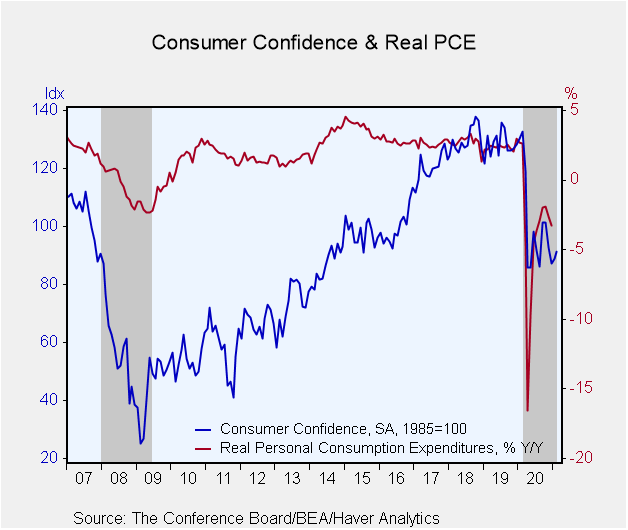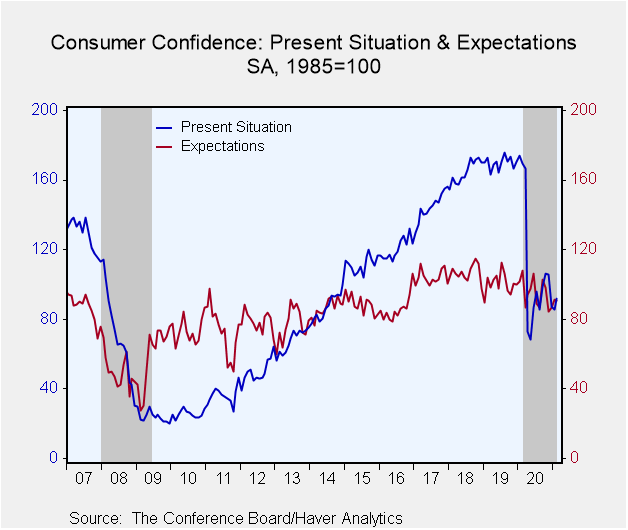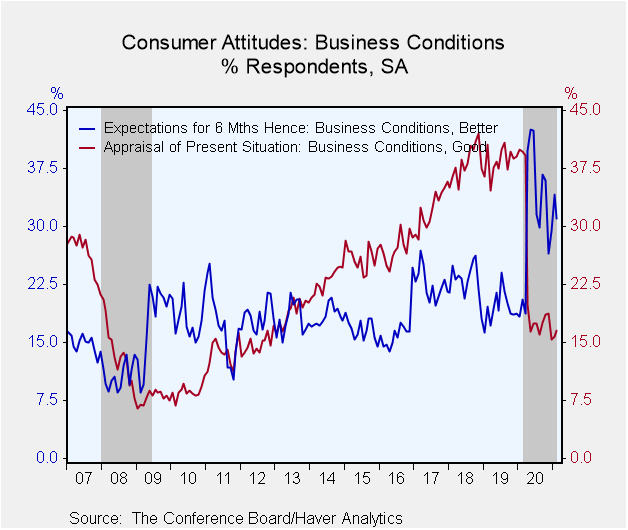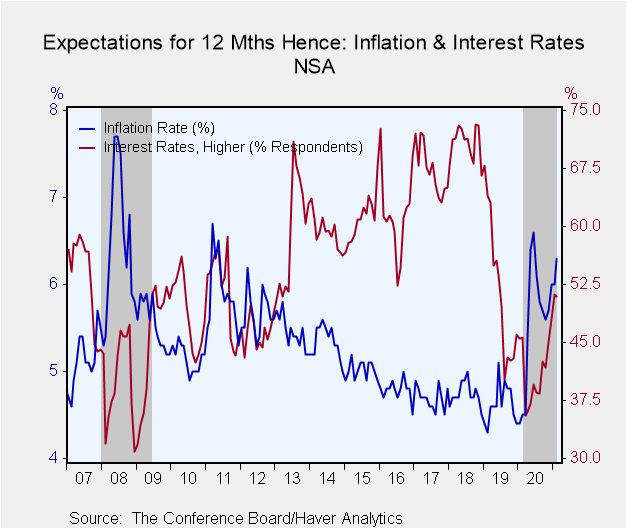 Global| Feb 23 2021
Global| Feb 23 2021U.S. Consumer Confidence Increases in February
by:Tom Moeller
|in:Economy in Brief
Summary
• Consumer confidence added to its January improvement. • Current conditions reading gains while expectations weaken. • Job market readings improve. The Conference Board Consumer Confidence Index increased 2.7% (-31.1% y/y) to 91.3 [...]
• Consumer confidence added to its January improvement.
• Current conditions reading gains while expectations weaken.
• Job market readings improve.
The Conference Board Consumer Confidence Index increased 2.7% (-31.1% y/y) to 91.3 during February after rising 2.1% to 88.9 in January, revised from 89.3. It was the highest reading in three months, though it has trended sideways since tumbling to 85.7 last April. A reading of 90.0 had been expected in the Action Economics Forecast Survey.
The reading of the Present Situation index rebounded 7.6% (-45.7% y/y) to 92.0 after sliding to 85.5 in January. The Consumer Expectations reading eased 0.4% (-16.0% y/y) this month to 90.8. It has been moving erratically lower since October 2018.
The jobs gap, representing the difference between respondents indicating that jobs are plentiful and those saying jobs are hard to get, improved to 0.7% from -2.5%, suggesting that job market deterioration has stabilized. This series has a 79% correlation with the unemployment rate over the last ten years. The rise last month in the labor market differential occurred as the jobs plentiful measure rose and the jobs hard to get index fell.
Business conditions were perceived as good m/m by a slightly improved 16.5% of respondents. That remained down from 40.0% in January of last year. Expectations that business conditions would improve in six months fell to 31.0%, remaining below last May's high of 42.5%. More jobs were expected in six months by a lessened 26.1% of respondents. The percentage expecting income to increase eased to 15.2% and has been falling since it reached 22.7% twelve months ago.
The expected inflation rate in twelve months rose sharply to 6.3%. That was increased from the 4.5% twelve months ago. The share of respondents planning to buy a new home fell to 0.9% in February and has been trending down since the 2.0% high in June of last year. Those planning on buying a major appliance declined to 44.0% from 48.7%.
Confidence of individuals both under 35 and for the 35-to-54 age group improved modestly. Confidence also rose for those over 55 but remained down sharply from September.
The Consumer Confidence data are available in Haver's CBDB database. The total indexes, which are indexed to 1985=100, appear in USECON, and the market expectations are in AS1REPNA.
Semiannual Monetary Policy Report to the Congress from Federal Reserve Chair Jerome H. Powell is available here.
| Conference Board (SA, 1985=100) | Feb | Jan | Dec | Feb '20 | 2020 | 2019 | 2018 |
|---|---|---|---|---|---|---|---|
| Consumer Confidence Index | 91.3 | 88.9 | 87.1 | 132.6 | 101.0 | 128.3 | 130.1 |
| Present Situation | 92.0 | 85.5 | 87.2 | 169.3 | 109.8 | 169.8 | 164.8 |
| Expectations | 90.8 | 91.2 | 87.0 | 108.1 | 95.2 | 100.6 | 107.0 |
| Jobs Gap (%) | 0.7 | -2.5 | -1.9 | 32.6 | 6.8 | 33.2 | 27.6 |
| Jobs Plentiful (%) | 21.9 | 20.0 | 21.0 | 46.5 | 27.8 | 45.8 | 42.0 |
| Jobs Hard to Get (%) | 21.2 | 22.5 | 22.9 | 13.9 | 21.0 | 12.6 | 14.4 |
Tom Moeller
AuthorMore in Author Profile »Prior to joining Haver Analytics in 2000, Mr. Moeller worked as the Economist at Chancellor Capital Management from 1985 to 1999. There, he developed comprehensive economic forecasts and interpreted economic data for equity and fixed income portfolio managers. Also at Chancellor, Mr. Moeller worked as an equity analyst and was responsible for researching and rating companies in the economically sensitive automobile and housing industries for investment in Chancellor’s equity portfolio. Prior to joining Chancellor, Mr. Moeller was an Economist at Citibank from 1979 to 1984. He also analyzed pricing behavior in the metals industry for the Council on Wage and Price Stability in Washington, D.C. In 1999, Mr. Moeller received the award for most accurate forecast from the Forecasters' Club of New York. From 1990 to 1992 he was President of the New York Association for Business Economists. Mr. Moeller earned an M.B.A. in Finance from Fordham University, where he graduated in 1987. He holds a Bachelor of Arts in Economics from George Washington University.
More Economy in Brief
 Global| Feb 05 2026
Global| Feb 05 2026Charts of the Week: Balanced Policy, Resilient Data and AI Narratives
by:Andrew Cates










